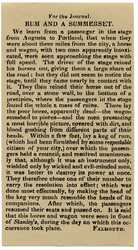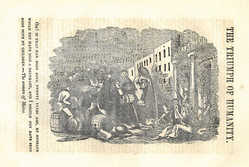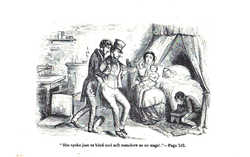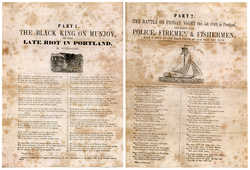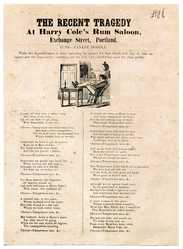Prohibition vs. License
Early 19th century
Collections of Maine Historical Society; gift of Marian Bucholtz, 1965
Broadside 282
This verse summarizes the hope of moral improvement for individuals and communities which many people started to feel after 1820.
The Battle Axe
Portland, July 4, 1849
Collections of Maine Historical Society
Newspapers 3-42
This depiction of drinkers in a Clay Cove (Portland waterfront) saloon, clearly depicts Irish-Americans in a cartoon style with the hat and pipe still used to symbolize the Irish.
"Burns is a devil when he's drunk.... I tried to keep his hands off the little girl-she was a delicate thing you know, and only two years old...he catched her away from me and shook her furiously, dashed her down over a chair, and went out the door with an oath ....I think her back was broke, and last night she died." Metta Victoria Fuller, 1853
Rum, Fire Water
published in Ahiamihewintuhangan: The Prayer Song, 1858
Collections of Maine Historical Society
QJ 282 V642.1
This book of hymns, written in both Passamaquoddy and English, depicts the Devil giving Native Americans rum and whiskey. As in many temperance images, a mother and child plead father not to indulge.
The Battle Axe
Portland, June 10, 1849
Collections of Maine Historical Society
Newspapers 3-42
This newspaper was one of many local and prohibition sheets of the time. What sets it apart is its unusual, wood cut illustrations, depicting, and occasionally naming local, tipplers.
Effie Raymonds Life-Work, Going with the Stream, and other stories
National Temperance Society and Publication House, 1883
Courtesy of William and Debra Barry
Father Matthew Plate
White earthenware, ca. 1849
Courtesy of the Charles E. Burden Collection
Father Theobald Matthew (1790-1856), an Irish priest concerned about drinking in his homeland began a highly successful temperance crusade in 1838. He supposedly administered some five million abstinence pledges prior to 1844. In 1849 he took his work to the United States and was responsible for hundreds of thousands of Irish-Americans taking the temperance pledge. According to Matthew Barker, the Temperance Priest was scheduled to speak in Gardiner, Maine, in the summer of 1849, but was apparently thwarted by ill health.
Rum and a Summerset
Washingtonian Journal, Portland, April 8, 1846
Collections of Maine Historical Society
Newspapers 1-32
This report of an incident in Falmouth, by riders of the stage between Augusta and Portland, suggests the rather callous regard many citizens had for drinkers. The wreck of a wagon hauling rum elicited disgust rather than compassion. Rather than attending the wounded riders and their horse, the passengers simply smashed the keg of rum, which they saw as the root cause.
Principal Causes of Spontaneous Combustion
Journal of Literature, Science, Morals and Religion, Bangor June 29, 1837
Collections of Maine Historical Society; gift of Earle G. Shettleworth, Jr.
One theory suggested that drinking was a major cause of spontaneous combustion.
Rumseller's Diary
Washingtonian Journal, Portland, March 5, 1845
Collections of Maine Historical Society
Newspapers 1-32
Co-Partnership/Death & Co.
England, mid 19th century
Collections of Maine Historical Society
The most frequently illustrated problem of drunkenness, the child trying to remove father from a barroom suggests that many people saw the family in serious jeopardy.
Come Home Father, mid 19th century
Ink on paper
Collections of Maine Historical Society
Coll. 1863, Box 3
This verse summarizes the hope of moral improvement for individuals and communities which many people started to feel after 1820.
The Drunkard's Child's Farewell
Sheet Music, 1888
Courtesy of Timothy L. Smith
Written by Saco's William Grant Brooks (1869 - ca.1925), this popular song tells of the death of an alcoholic's neglected daughter. The lyrics reflect a growing awareness of domestic violence and its link to booze.
"Be good to mama now when I'm gone. Don't strike her anymore. Be good, dear papa, stop drinking, farewell! Till we meet on that golden shore."
Dr. Bolus and his Patients
Merriam, Moore & Co. Troy, NY, early 19th century
Collections of Maine Historical Society
S.C. 853
Triumph of Humanity
published in The Napoleon of Temperance: Sketches of the Life and Character of the Hon. Neal Dow, Mayor of Portland and author of the Maine Liquor Law, New York, NY 1852
Collections of Maine Historical Society
B D752m
The Sedley Family or the Effect of the Maine Liquor Law
Boston, 1853
Courtesy of the Charles E. Burden Collection
A dramatic depiction of the harm of drunkeness on family life, this book also provides marvelous written and visual propaganda about the supposed success of Neal Dow's legislation.
Portland Rumsellers Black List
Washingtonian Journal, Portland, March 5, 1845
Collections of Maine Historical Society
Newspapers 1-32
Irish-Americans had begun to join the ranks of Yankee saloon keepers and liquor dealers. Only one "shee-rumseller" is listed, but women soon found the trade lucrative. Kitty Kentuck (ca. 1810-1866), was the street name for Portland's most celebrated liquor seller.
Portland Riot Broadsides, Portland, 1849
Courtesy of a Private Collection
These broadsides commemorate the famous bawdyhouse gunfights in Portland. They blame the affair, which left one man dead, 14 wounded and a dance hall in ashes, on drinking. Actually, Portland, Bangor, and some smaller communities, were prone to rather frequent outbreaks of violence. While drinking played a role, most riots were sparked by other social, economic, or cultural forces.
The Recent Tragedy at Harry Cole's Rum Saloon
Portland, Maine, ca. 1849
Collections of Maine Historical Society
On April 7, 1849 Jere Swett was indulging himself at the Exchange Street saloon of Harrison G. Cole, who was himself a drunken roarer. Swett's wife, angered by his habitual drinking, removed him from the saloon. She then returned to turn her vengeance on the bar and Harry Cole.
According to the Portland Transcript of April 14, 1849, "Mrs. Swett demolished the weapons of the enemy that steals men's brains away, and the way glass rattled and the liquor flowed was a caution to rumsellers. Decanters, tumblers and windows all fell victim to the assault and thus was one of King Alchy's strongholds stormed by a woman." The first name of this forceful woman has become a casualty of history, but soon others would follow her example. In 1855 Cole closed his bar and became a temperance speaker.







